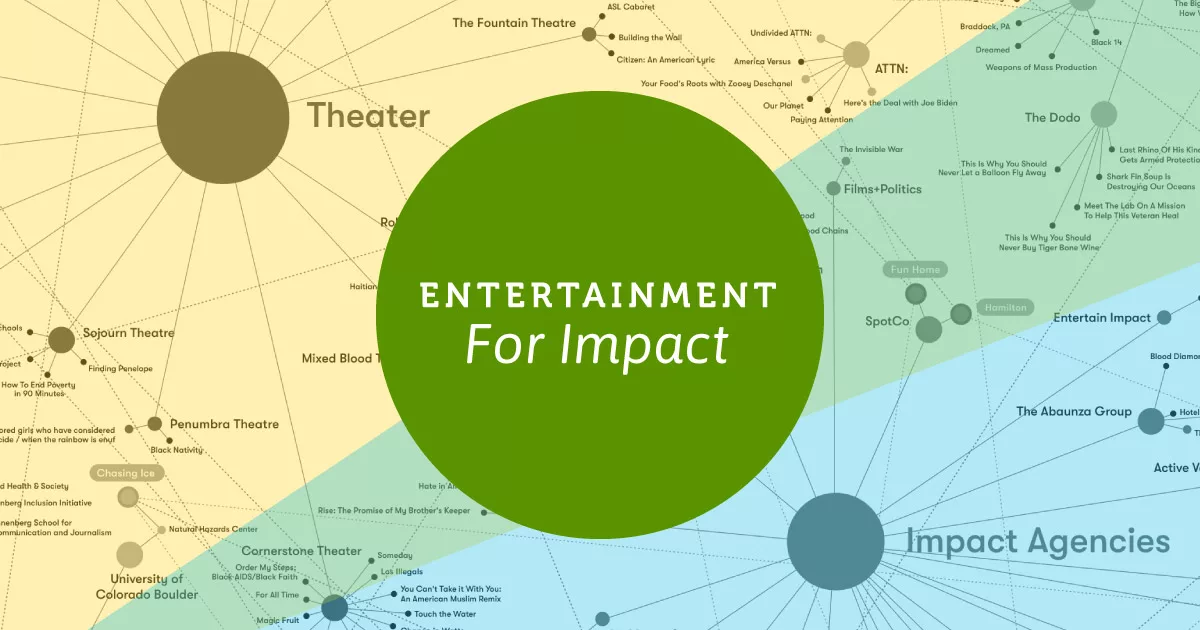By Lindsay Smalling
There is an emerging ecosystem driving impact within the entertainment industry. Impact investors and social entrepreneurs would be wise to take note and engage this influential community.
The recent Spark Change Summit in Los Angeles brought together producers, directors, and screenwriters who represent a growing segment of the entertainment industry that is actively using the power of entertainment to drive positive social change. The Skoll Center for Social Impact Entertainment at the UCLA School of Theater, Film and Television highlighted their recently-released report and map that charts this ecosystem: The State of Social Impact Entertainment.
A First Look at a New Field
Peter Bisanz, the Executive Director of The Skoll Center for Social Impact Entertainment at UCLA frames this work as, “our first attempt to capture this field as it exists today.”
Some of the key questions they attempt to answer in this report may sound very familiar to impact investors, social entrepreneurs, and other practitioners within the SOCAP community:
- How can we engage audiences on social issues?
- Which metrics should we use to actually determine the impact of a project?
- What theories of change should we pay attention to?
In the SIE ecosystem, community members are asking these questions in the context of mass entertainment. There was even a variation of a familiar refrain, All entertainment is impact entertainment – the question is whether it is a positive or negative impact.
SIE and Impact Investing
Impact investing was born out of a recognition that all capital is impact capital, for better or worse. Expertise, tools and resources that are well understood at each end of the spectrum of capital, from pure philanthropy to pure capitalism, could be shared and harnessed for greater positive impact. And as the impact ecosystem has grown, experts in technology, international development, measurement, law, policy and more have brought tools to the table to accelerate sustainable global solutions. Outreach to more fully integrate the entertainment industry in conversations about accelerating impact is long overdue.
Attending the Spark Change Summit made clear that media and entertainment wield tools that have largely been underutilized by impact investors. There is tremendous potential in bringing entertainment and investing conversations together. Though our community focuses on using the tools of business and the power of markets to solve social problems, we share with the SIE movement the recognition that it will take a wide scale shift in narrative to create the change we want to see in the world.
Examples of SIE in Practice
Some SIE efforts are intended solely to raise awareness of social challenges and to start conversations in communities where those discussions are critically necessary precursors to creating real change. For example, America to Me, a documentary series on a year in the life of students at Oak Park and River Forest High School in Chicago, was shown in screenings across the United States to raise awareness of the real impact of systemic racism and classism.
Shifting the narrative is of course only part of the work. Participant Media, the entertainment group founded by Jeff Skoll, is also partnering with organizations doing the work on the ground to go beyond awareness to action. They shared some of the work they are doing to convert narrative shift to real change. For example, when they released RBG and On the Basis of Sex, they partnered with the ACLU to raise awareness of existing legal issues that entrench discrimination against women.
Stories that are well told hit us at a deeper level. Johanna Blakley from the The Norman Lear Center shared research demonstrating significant reduction in bias and increase in behavior change based on exposure to issues via narrative storylines, whereas exposure to these issues via news mediums had negligible effect. Bringing stories such as these to audiences across the country can raise awareness of challenges and encourage the kind of empathy that changes hearts and minds.
Collaborations Between Content Creators and Change Makers
Two weeks after the Spark Change Summit, another event was held at the Getty Center in Los Angeles with a similar theme and set of participants. A day of Unreasonable Conversation, hosted by social impact agency Propper Daley, brought together TV writers, showrunners, and producers with leading thinkers and activists for an inaugural convening that “connects content creators with leading changemakers to unlock progress through the power of stories.” The speaker list is an incredible roster of celebrities and public figures, and many of the funders are leading foundations within impact investing such as the Ford Foundation, MacArthur Foundation, and W.K.Kellogg Foundation.
And from within the impact investing community, Morgan Simon and Candide Group have recently catalyzed an impressive group of actors, athletes, artists and activists around divesting from private prisons through the #realmoneymoves campaign. That effort goes beyond using the entertainment value of media, to activating influential figures to move money in alignment with their values.
A Significant Opportunity to Create Impact
With all of the conversations around financial and business innovations to catalyze change, how has the power of entertainment, art and media to shift culture been so minimal thus far?
There is a real opportunity here for our movements to work more closely together. It was striking that there was not a single conversation at the Spark Change Summit around impact investment (though investors are featured on the map), and, likewise, the entertainment industry is rarely on the agenda at SOCAP and other industry convenings.
We will be making an effort to better engage the arts and entertainment community in SOCAP. If you are interested in learning more about this emerging ecosystem, take a look at the resources available at the SIE site, particularly the map, and add yourself to these resources if you are already doing work in this area. In our collective efforts to unlock the potential of global markets for impact, we cannot overlook the role of entertainment in shifting the narrative.




